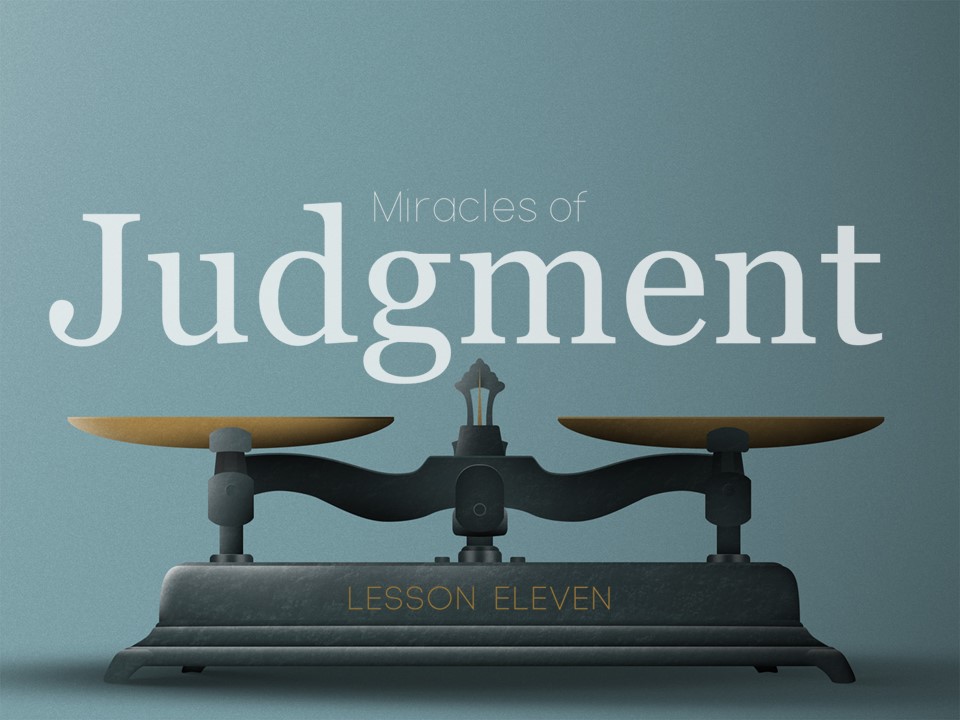LESSON ELEVEN
MIRACLES OF JUDGMENT
A. JESUS IS THE GREAT JUDGE:
The two miracles studied in this lesson show that Jesus is the great judge of mankind. There are many Scriptures that also state this clearly. “For the Father judgeth no man, but hath committed all judgment unto the Son” (John 5:22). “…It is he which was ordained of God to be the Judge of quick and dead” (Acts 10:42). “…He will judge the world in righteousness by that man whom he hath ordain…” (Acts 17:31). “…Lord Jesus Christ, who shall judge the quick and the dead at his appearing and his kingdom” (II Timothy 4:1).
B. JESUS CURSED THE BARREN FIG TREE:
1. SCRIPTURAL REFERENCES: Matthew 21:17-19 & Mark 11:12-14, 20-26.
2. CIRCUMSTANCES:
After the triumphal entry into Jerusalem Jesus and His disciples retired to Bethany for the night. Early the next morning they start out for Jerusalem. As Jesus traveled along He grew hungry. Beside the road before them stood a fig tree conspicuous because of its abundant foliage. The fig season was later but this tree gave promise of premature fruit. With the fig tree the fruit appears before the foliage, and therefore, there should be fruit.
Jesus came to the tree but found nothing but leaves. Jesus cursed the tree and pronounced judgment. “Let no man eat fruit from thee.”
They went into Jerusalem for the day but again retired in the evening to Bethany. The next morning as they entered the city they found the fig tree withered up from the roots.
3. NEED:
The need here was for fruit. There was promise of fruit but only the promise. The tree was barren.
4. HOW WAS THE MIRACLE PERFORMED?
The miracle of judgment took place simply at a simple word of Jesus.
There was no immediate effect for the judgment took place at the roots. The disciples may have looked for something to happen immediately. The next morning they were astonished when they saw the withered fig tree.
5. RESULTS AND THE LESSON TAUGHT:
The fig tree is a type of the nation of Israel and also the lesson may apply to the church.
There must be foliage, which stands for religious profession. However, the Lodi is satisfied with just a profession – there must be fruit. Any nation or church, which has no fruit but only a profession, will eventually dry up at the roots.
The roots are the first to whither. This speaks of our prayer life. This is where one begins to dry up first.
C. JESUS CLEANSED THE TEMPLE:
1. SCRIPTURAL REFERENCES: Matthew 21:12-13; Mark 11:15-17; Luke 19:45-46; John 2:13-25.
2. CIRCUMSTANCES:
Jesus cleansed the temple on two different occasions, one at the very beginning of His ministry and again at the close of His ministry right after the triumphant entry.
We classify these incidents with His miracles for it never could have taken place without a miracle. Otherwise the moneychangers would never have permitted it.
The court of the Gentile had become a market of oxen, sheep and doves, which the worshippers needed for sacrificing. Moneychangers exchanged foreign money for the
shekel, which was the only currency accepted in the temple. It was a very noisy place with the bargaining of the merchants and the noise from the animals. The priests tolerated this for they derived revenue from this commercialism.
The righteous indignation of our Lord was aroused and He declared that the house of God had become a “den of thieves.”
3. NEED:
The temple had been polluted and desecrated with commercialism. The whole place was corrupt.
4. HOW WAS THIS MIRACLE PERFORMED:
Jesus took a whip and followed by His disciple’s drove out the animals through the temple door, overturning the money tables at the same time. The priests were very unpopular and knew that it was better not to interfere.
Jesus then declared “my house shall be called the house of prayer.”
5. RESULTS AND THE LESSON TAUGHT:
This act of judgment teaches that the house of God should always be kept sanctified and holy.
It also teaches that there is a righteous indignation, which is proper, when it rises against wrong. This is not a carnal anger.


